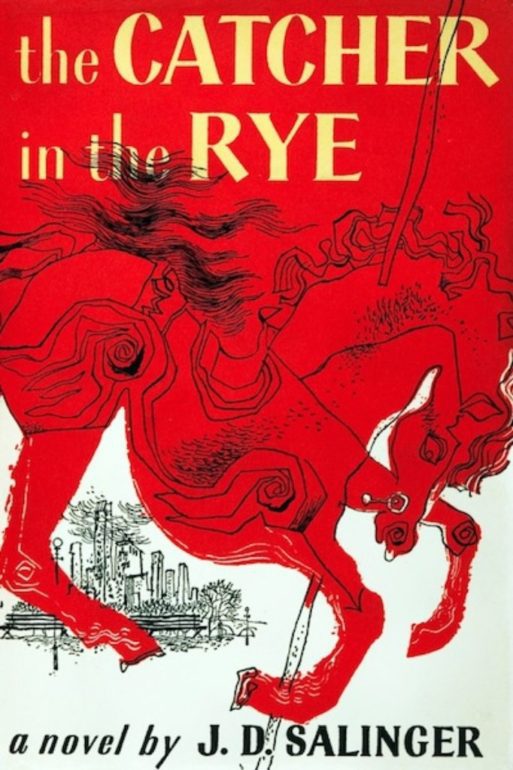
The Catcher in the Rye was partially published in serial form 1945–46 before being novelized in 1951 by Little, Brown and Company.
“The Catcher in the Rye” frequently appears on lists, such as “Top 10 Books You Were Forced to Read in School.” Many Americans have read, or pretended to read, the classic novel by J.D. Salinger. Holden Caulfield, the angst-ridden protagonist, is incredibly famous as the ultimate whiner. Most readers walk away from the novel focused on Holden’s social criticism: everyone’s a phony. However, I encourage you to reread the classic and view the story in a new light, one of a teenager who’s grieving without a way to process.
Salinger’s novel opens with Holden complaining about his current boarding school, which readers soon find out is the third in a string of boarding schools he’s been kicked out of. Everyone and everything is the subject of Holden’s negativity as he spends his final evening at Pencey Preparatory Academy. Eventually, his roommate charms Holden into writing an essay for him. The essay is supposed to describe a place.
The thing is, Holden can’t think of a place to write about. The reader will understand by the end, this may be because Holden doesn’t yet have a place to call his own. Instead, he writes about his kid brother’s baseball mitt, which “had poems written all over the fingers and the pocket and everywhere. In green ink.” Holden follows up this description with, “He’s dead now. He got leukemia and died when we were up in Maine, on July 18, 1946.”

Holden recounts a couple of anecdotes about Allie, his red hair, his sense of humor, and how nice his little brother was. Then he tells readers, “I was only 13, and they were going to have me psychoanalyzed and all, because I broke all the windows in the garage. […] I slept in the garage the night he died, and I broke all the windows with my fist, just for the hell of it.” Holden admits, “It was a very stupid thing to do,” but quickly follows with “you didn’t know Allie.”
Readers then watch Holden pick a fight with his roommate, get his nose punched, and run away from Pencey in the middle of the night. One bad, impulsive decision after another lands Holden in a crummy hotel in Manhattan, desperate for human connection. He has an unsuccessful tryst with a prostitute, tries to woo older ladies at a club, meets up with a old classmate, sneaks in to see his sister, and finally calls up a mentor to vent.
Memories of Allie are sparse in Holden’s stream of consciousness style of story-telling, but the pain of loss is present in all of Holden’s experiences. Toward the end of Holden’s tale, readers learn he was also witness to the suicide of a classmate at one of his previous boarding schools. The theme of loss without a way to process, to work through the grief, continues to impact all of Holden’s interactions and the filters through which he experiences the world.

Salinger once shared, “My boyhood was very much the same as that of the boy in the book, and it was a great relief telling people about it.”
“The Catcher in the Rye” ends with Holden in a hospital, speaking with a doctor. Though his family, especially his older brother, seems more invested in Holden’s mental health, readers are not assured that Holden’s gotten the help he needs. His last words read, “Don’t ever tell anybody anything. If you do, you start missing everybody.” However, talking about pain, loss, and grief are exactly what needs to happen in order for healing to take place.
Significant strides have been made in the caring for mental health and how society views people who may need counseling since Salinger published his debut novel. Thankfully, people who are grieving are now encouraged to seek help and talk about their loss. Taking another look at Holden as a teenager who desperately needs to process his feelings about Allie’s death may explain all of his reckless behavior and negative outlook. Revisiting this classic may lend more insight into the mind of a teenager who is in pain and in need of support.

 The Catcher in the Rye by J.D. Salinger
The Catcher in the Rye by J.D. Salinger


 Our Annual Seven Holiday Gifts for Someone Who Is Grieving, 2024 Edition
Our Annual Seven Holiday Gifts for Someone Who Is Grieving, 2024 Edition

 “Hands Up to the Sky” by Michael Franti & Spearhead
“Hands Up to the Sky” by Michael Franti & Spearhead















I am 63 years old and never read most of the classics. Recently I began a quest to read as many of the classics as I could. I thorough enjoyed To Kill a Mockingbird and the Great Gatsby as well as many others. But for the life of me I do not understand why this book is considered a literary classic. The overuse of G**D*** every third or fourth sentence is tiring and without provocation in almost all instances. I see Caulfield’s depression and cynicism stems from not processing the death of his brother and possibly his roommate, however I feel the book would have been just as impactful without the overuse of that word. If Salinger were alive today, I would wash HIS mouth out with soap.
Report this comment